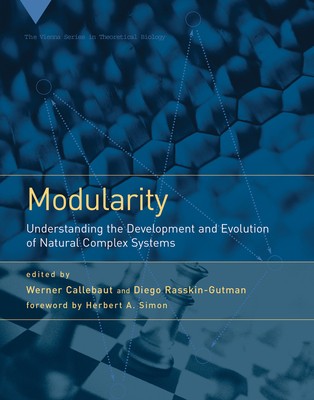
- We will send in 10–14 business days.
- Publisher: MIT Press
- ISBN-10: 0262513269
- ISBN-13: 9780262513265
- Format: 16.8 x 21.8 x 2.5 cm, softcover
- Language: English
- SAVE -10% with code: EXTRA
Modularity (e-book) (used book) | bookbook.eu
Reviews
Description
Experts from diverse fields, including artificial life, cognitive science, economics, developmental and evolutionary biology, and the arts, discuss modularity.Modularity--the attempt to understand systems as integrations of partially independent and interacting units--is today a dominant theme in the life sciences, cognitive science, and computer science. The concept goes back at least implicitly to the Scientific (or Copernican) Revolution, and can be found behind later theories of phrenology, physiology, and genetics; moreover, art, engineering, and mathematics rely on modular design principles. This collection broadens the scientific discussion of modularity by bringing together experts from a variety of disciplines, including artificial life, cognitive science, economics, evolutionary computation, developmental and evolutionary biology, linguistics, mathematics, morphology, paleontology, physics, theoretical chemistry, philosophy, and the arts.
The contributors debate and compare the uses of modularity, discussing the different disciplinary contexts of modular thinking in general (including hierarchical organization, near-decomposability, quasi-independence, and recursion) or of more specialized concepts (including character complex, gene family, encapsulation, and mosaic evolution); what modules are, why and how they develop and evolve, and the implication for the research agenda in the disciplines involved; and how to bring about useful cross-disciplinary knowledge transfer on the topic. The book includes a foreword by the late Herbert A. Simon addressing the role of near-decomposability in understanding complex systems.
EXTRA 10 % discount with code: EXTRA
The promotion ends in 20d.18:03:06
The discount code is valid when purchasing from 10 €. Discounts do not stack.
- Publisher: MIT Press
- ISBN-10: 0262513269
- ISBN-13: 9780262513265
- Format: 16.8 x 21.8 x 2.5 cm, softcover
- Language: English English
Modularity--the attempt to understand systems as integrations of partially independent and interacting units--is today a dominant theme in the life sciences, cognitive science, and computer science. The concept goes back at least implicitly to the Scientific (or Copernican) Revolution, and can be found behind later theories of phrenology, physiology, and genetics; moreover, art, engineering, and mathematics rely on modular design principles. This collection broadens the scientific discussion of modularity by bringing together experts from a variety of disciplines, including artificial life, cognitive science, economics, evolutionary computation, developmental and evolutionary biology, linguistics, mathematics, morphology, paleontology, physics, theoretical chemistry, philosophy, and the arts.
The contributors debate and compare the uses of modularity, discussing the different disciplinary contexts of modular thinking in general (including hierarchical organization, near-decomposability, quasi-independence, and recursion) or of more specialized concepts (including character complex, gene family, encapsulation, and mosaic evolution); what modules are, why and how they develop and evolve, and the implication for the research agenda in the disciplines involved; and how to bring about useful cross-disciplinary knowledge transfer on the topic. The book includes a foreword by the late Herbert A. Simon addressing the role of near-decomposability in understanding complex systems.


Reviews